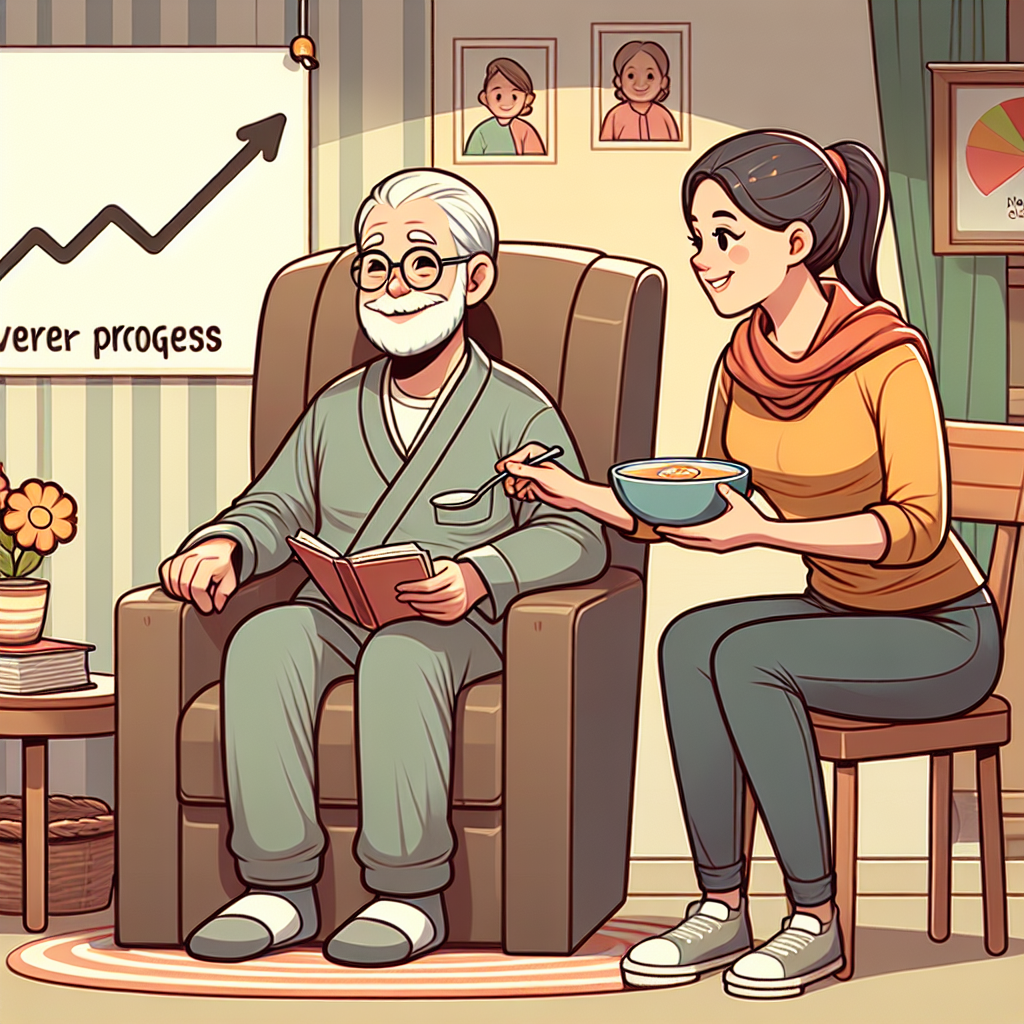-
Table of Contents

“Empower Recovery: Fueling Hope with Every Positive Step Forward”
Introduction
“The Power of Positivity: Encouraging Your Family Member’s Recovery Progress” explores the transformative impact of a positive mindset on the healing journey of a loved one. This guide delves into the science behind positive reinforcement, the role of emotional support, and practical strategies to foster an environment conducive to recovery. By emphasizing optimism, resilience, and encouragement, it aims to empower families to become active participants in their member’s path to wellness, highlighting the profound influence of positivity on physical and mental health outcomes.
Celebrating Small Wins: How Positive Reinforcement Boosts Recovery
In the journey of recovery, whether from illness, addiction, or any other challenging situation, the road can often seem long and arduous. For family members supporting a loved one through this process, it is essential to recognize the power of positivity and the profound impact it can have on recovery progress. Celebrating small wins and using positive reinforcement can significantly boost morale and motivation, creating a nurturing environment that fosters healing and growth.
One of the most effective ways to encourage a family member’s recovery is by acknowledging and celebrating their small victories. These milestones, no matter how minor they may seem, are crucial indicators of progress and should be recognized as such. For instance, if a loved one is recovering from surgery, celebrating their first steps without assistance can be a powerful motivator. Similarly, for someone overcoming addiction, acknowledging a week of sobriety can provide the encouragement needed to continue on the path to recovery.
Positive reinforcement plays a pivotal role in this process. By offering praise and encouragement, you help to build your loved one’s self-esteem and confidence. This, in turn, can lead to increased resilience and a stronger determination to overcome obstacles. For example, simple words of affirmation like “I’m proud of you” or “You’re doing great” can have a profound impact on their mindset. Additionally, tangible rewards, such as a favorite meal or a small gift, can serve as a reminder of their achievements and the support they have from their family.
Moreover, creating a positive and supportive environment is essential for recovery. This involves not only celebrating successes but also providing a safe space for your loved one to express their fears and frustrations. Active listening and empathetic responses can help them feel understood and valued, which is crucial for their emotional well-being. Encouraging open communication and being patient with their progress can make a significant difference in their recovery journey.
It is also important to set realistic goals and expectations. Recovery is rarely a linear process, and setbacks are a natural part of the journey. By setting achievable milestones and celebrating each one, you can help your loved one maintain a positive outlook. For instance, if they are working on regaining physical strength, setting goals like walking a certain distance or completing a specific exercise can provide a sense of accomplishment. Each small win builds momentum, making the larger goal seem more attainable.
Furthermore, involving the entire family in the recovery process can create a strong support network. Family members can take turns offering encouragement, sharing responsibilities, and celebrating achievements. This collective effort not only lightens the load but also reinforces the message that your loved one is not alone in their journey. Family activities, such as group walks or game nights, can also provide a sense of normalcy and joy, which are vital for mental and emotional health.
In conclusion, the power of positivity cannot be overstated when it comes to encouraging a family member’s recovery progress. Celebrating small wins and using positive reinforcement can significantly boost their motivation and resilience. By creating a supportive environment, setting realistic goals, and involving the entire family, you can help your loved one navigate the challenges of recovery with hope and determination. Remember, every small step forward is a victory worth celebrating, and your unwavering support can make all the difference in their journey to healing.
Creating a Supportive Environment: The Role of Positivity in Family Healing
Creating a supportive environment is crucial when a family member is on the path to recovery, and the power of positivity cannot be overstated in this context. Positivity acts as a catalyst, fostering an atmosphere where healing and growth can flourish. When a family member is recovering from an illness, addiction, or any other challenging situation, the collective attitude of the family can significantly influence their progress. By embracing positivity, families can create a nurturing environment that encourages resilience and determination.
One of the first steps in fostering a positive environment is to focus on the language used within the household. Words have immense power, and positive affirmations can uplift and motivate. Instead of dwelling on setbacks, families should celebrate small victories and milestones. This shift in focus from what is lacking to what has been achieved can instill a sense of accomplishment and hope in the recovering individual. For instance, rather than saying, “You still have a long way to go,” one might say, “Look how far you’ve come.” This subtle change in phrasing can make a world of difference in how progress is perceived.
Moreover, it is essential to practice active listening. When a family member feels heard and understood, it reinforces their sense of belonging and support. Active listening involves more than just hearing words; it requires empathy and genuine interest in the person’s feelings and experiences. By validating their emotions and providing a safe space for them to express themselves, families can help alleviate feelings of isolation and frustration that often accompany the recovery process.
In addition to verbal encouragement, non-verbal cues play a significant role in creating a positive environment. Simple gestures such as a warm smile, a reassuring touch, or maintaining eye contact can convey love and support. These non-verbal affirmations can be incredibly comforting and can help build a strong emotional connection, which is vital for recovery.
Furthermore, setting realistic and achievable goals is another way to foster positivity. Unrealistic expectations can lead to disappointment and discouragement, whereas attainable goals provide a sense of direction and purpose. Families should work together to set these goals, ensuring they are aligned with the recovering individual’s capabilities and aspirations. Celebrating each achievement, no matter how small, reinforces the idea that progress is being made and that every step forward is valuable.
It is also important to create a physically positive environment. A clean, organized, and welcoming space can have a profound impact on one’s mental and emotional well-being. Incorporating elements such as natural light, plants, and personal touches can make the environment more conducive to healing. Additionally, engaging in activities that promote relaxation and joy, such as family game nights, outdoor walks, or creative hobbies, can help reduce stress and build positive memories.
Lastly, self-care for family members is crucial. Supporting a loved one through recovery can be emotionally taxing, and it is essential for family members to take care of their own well-being. By maintaining their health and positivity, they can be more effective in providing the necessary support. This might involve seeking professional help, joining support groups, or simply taking time for personal relaxation and reflection.
In conclusion, the power of positivity in creating a supportive environment for a family member’s recovery cannot be underestimated. Through positive language, active listening, non-verbal affirmations, realistic goal-setting, a nurturing physical environment, and self-care, families can significantly enhance the recovery process. By fostering an atmosphere of love, encouragement, and hope, families can help their loved ones navigate the challenging journey of recovery with greater resilience and optimism.
Q&A
1. **Question:** How can positive reinforcement aid in a family member’s recovery process?
**Answer:** Positive reinforcement can boost a family member’s motivation and self-esteem, encouraging them to continue making progress in their recovery by acknowledging their efforts and achievements.
2. **Question:** What are some practical ways to show support and encouragement to a family member during their recovery?
**Answer:** Practical ways to show support include celebrating small milestones, offering words of encouragement, being patient and understanding, actively listening to their concerns, and participating in their recovery activities.
Conclusion
The power of positivity plays a crucial role in encouraging a family member’s recovery progress. By fostering a supportive and optimistic environment, family members can significantly enhance the emotional and psychological well-being of their loved one. Positive reinforcement, encouragement, and a hopeful outlook can motivate the individual to stay committed to their recovery journey, ultimately leading to better outcomes and a more resilient mindset.



